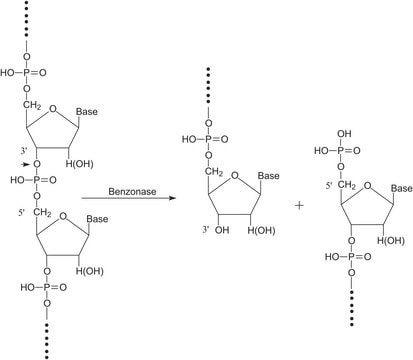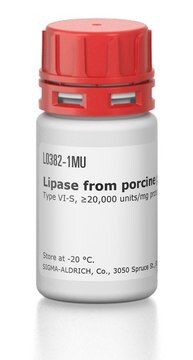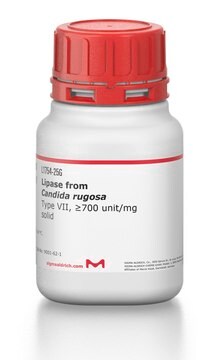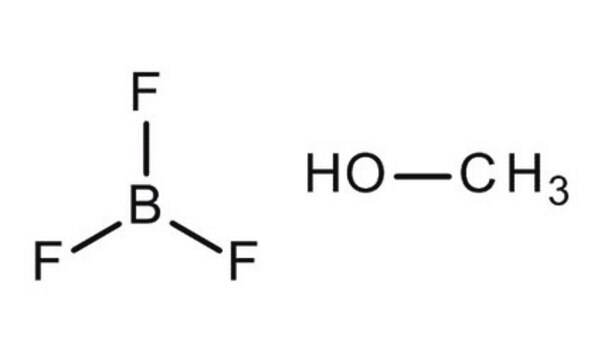62336
Lipoprotein Lipase from Pseudomonas sp.
lyophilized, powder, yellow-brown, ≥160 U/mg
Sign Into View Organizational & Contract Pricing
All Photos(1)
About This Item
Recommended Products
biological source
bacterial (Pseudomonas spp.)
Quality Level
form
powder
quality
lyophilized
specific activity
≥160 U/mg
color
yellow-brown
storage temp.
−20°C
Looking for similar products? Visit Product Comparison Guide
Biochem/physiol Actions
Lipoprotein lipase belongs to the family of triglyceride lipases. It hydrolyses triglycerides in triglyceride-rich ApoB-containing lipoproteins.
Unit Definition
1 U corresponds to the amount of enzyme which liberates 1 μmol of oleic acid per minute at pH 8.0 and 37°C (cholesteryl oleate, Cat. No. 26850, as substrate)
Storage Class
11 - Combustible Solids
wgk_germany
WGK 3
flash_point_f
Not applicable
flash_point_c
Not applicable
ppe
Eyeshields, Gloves, type N95 (US)
Certificates of Analysis (COA)
Search for Certificates of Analysis (COA) by entering the products Lot/Batch Number. Lot and Batch Numbers can be found on a product’s label following the words ‘Lot’ or ‘Batch’.
Already Own This Product?
Find documentation for the products that you have recently purchased in the Document Library.
Sumita Jain et al.
Infection and immunity, 81(4), 1277-1286 (2013-02-06)
Infection by the chronic periodontitis-associated pathogen Porphyromonas gingivalis activates a Toll-like receptor 2 (TLR2) response that triggers inflammation in the host but also promotes bacterial persistence. Our aim was to define ligands on the surfaces of intact P. gingivalis cells
Yong-Woon Ryu et al.
Zoological science, 30(3), 224-237 (2013-03-14)
Large amounts of neutral lipids (NLs) are stored as lipid droplets in the ooplasm of fish oocytes, providing an essential energy resource for developing embryos and larvae. However, little is known about the origin of such lipids or about mechanisms
Sajjad Rafiq et al.
Lipids in health and disease, 11, 155-155 (2012-11-16)
Genome wide association studies (GWAS), mostly in Europeans have identified several common variants as associated with key lipid traits. Replication of these genetic effects in South Asian populations is important since it would suggest wider relevance for these findings. Given
Autocrine endocannabinoid signaling through CB1 receptors potentiates OX1 orexin receptor signaling.
Maria H Jäntti et al.
Molecular pharmacology, 83(3), 621-632 (2012-12-13)
It has been proposed that OX(1) orexin receptors and CB(1) cannabinoid receptors can form heteromeric complexes, which affect the trafficking of OX(1) receptors and potentiate OX(1) receptor signaling to extracellular signal-regulated kinase (ERK). We have recently shown that OX(1) receptor
Masashi Moteki et al.
Rinsho byori. The Japanese journal of clinical pathology, 60(8), 734-739 (2012-12-04)
Many risk factors for coronary arterial diseases have been reported. Lipoprotein lipase (LPL) mass in serum has been suggested to be a new risk factor, but remains to be proven. The cardio-ankle vascular index (CAVI) was developed as a new
Our team of scientists has experience in all areas of research including Life Science, Material Science, Chemical Synthesis, Chromatography, Analytical and many others.
Contact Technical Service








